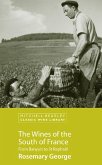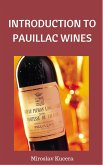One of the most complete histories of wine in France was written in the eighteenth century, a long chapter within Le Grand d'Aussy's masterwork on French food and wine (hopefully but misleadingly titled "History of the private life of the French from the origin of the nation until our days"). Le Grand starts with the Gauls, Greeks and Romans and the introduction of wine into France before discussing its development over the centuries and the appearance of the retail trade - merchants, taverns, inns - where wine could first be bought "by the pot". Starting with the first earthen vessels and wineskins used to transport wine, he traces the appearance of that useful microtechnology, the bottle.
Drawing (as he does throughout) on a wealth of earlier authors, Le Grand lists the various wines that had been most popular over the centuries and then gives a brief look at some of the most commonly used grapes. He touches on wine from unexpected places such as Brittany, Normandy and... Paris, which for centuries was known for its wine before detouring for some pages into a squabble between Burgundy and Champagne.
The French also drank foreign wines, including, once, those of Gaza and Cyprus, and he casts a glance at those before describing the ways in which wine could be used as a gift or payment and the celebrations associated with it. He ends with a look at "artificial wines", the highly flavored ancestors of todays cocktails and with the misnamed "fruit wines".
Though frequently cited in culinary texts, Le Grand's masterwork is rarely translated at length and this new modern translation is a rare opportunity to experience the scholarship and lively tone of this classic work directly.
Drawing (as he does throughout) on a wealth of earlier authors, Le Grand lists the various wines that had been most popular over the centuries and then gives a brief look at some of the most commonly used grapes. He touches on wine from unexpected places such as Brittany, Normandy and... Paris, which for centuries was known for its wine before detouring for some pages into a squabble between Burgundy and Champagne.
The French also drank foreign wines, including, once, those of Gaza and Cyprus, and he casts a glance at those before describing the ways in which wine could be used as a gift or payment and the celebrations associated with it. He ends with a look at "artificial wines", the highly flavored ancestors of todays cocktails and with the misnamed "fruit wines".
Though frequently cited in culinary texts, Le Grand's masterwork is rarely translated at length and this new modern translation is a rare opportunity to experience the scholarship and lively tone of this classic work directly.
Dieser Download kann aus rechtlichen Gründen nur mit Rechnungsadresse in A, B, CY, CZ, D, DK, EW, E, FIN, F, GR, H, IRL, I, LT, L, LR, M, NL, PL, P, R, S, SLO, SK ausgeliefert werden.









